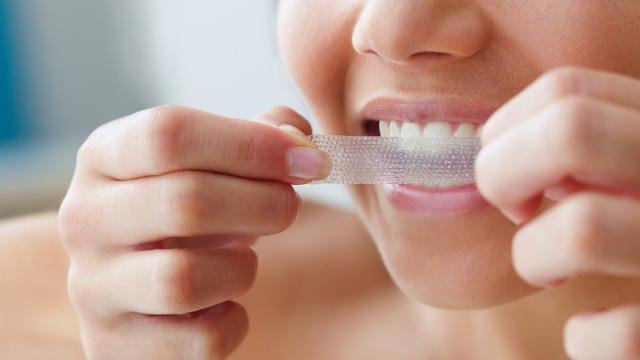Those strips and gels you use to get your teeth as pearly white as possible may come with some previously unknown risks, according to new, preliminary research out this week. It found that the key ingredient in these products — hydrogen peroxide — could be capable of damaging dentin, the second, deeper layer of our teeth that lies beneath the enamel surface.
Though organisations such as the American Dental Association do warn whitening products can cause tooth sensitivity or gum inflammation, they’re seen as temporary side effects that go away soon after you stop using them. And by and large, these products are considered safe and effective.
Research on teeth whitening has mainly focused on how hydrogen peroxide and other whitening agents affect enamel, the protective outer coating of teeth. But the authors behind this latest research, presented this week at the American Society for Biochemistry and Molecular Biology’s annual meeting, say that considerably less attention has been paid to how whitening products affect dentin, the bony tissue that makes up most of our teeth.
Previous work by the authors, led by Kelly Keenan, an associate professor of chemistry at Stockton University in New Jersey, had suggested that whitening agents could easily enough reach the dentin layer through our enamel. But they wanted to see how hydrogen peroxide, a common whitening ingredient, directly interacted with collagen, which accounts for the majority of protein found in dentin.
They used extracted human teeth and treated them with whitening strips using the instructions from the manufacturer, meaning they left them on for an hour (those with existing tooth sensitivity can use them for less time). The teeth were dunked in artificial saliva during this time, and were then washed for an hour.
Collagen and other proteins were then extracted from the teeth, and their levels tracked. A control group of un-whitened teeth served as a comparison, and to see if increased use of the strips would cause more damage, they also tested teeth that underwent three rounds of whitening.
“We measured collagen using two methods and saw a decrease when strips were used and it was a greater decrease with three rounds compared to one round,” Kellan told Gizmodo. “We saw similar results for the non-collagen proteins as well.”
The results are early, and not yet peer-reviewed, and Keenan’s team plans to further study how hydrogen peroxide affects collagen by next looking at how it affects pure collagen. At this point, though, it’s tough to say what the actual health implications of their research could be.
If whitening strips can cause damage to our teeth, it might not necessarily be a big deal, since the tooth’s pulp — the soft center of a tooth filled with nerves, blood vessels, and connective tissue — can regenerate lost collagen. But in people who have had root canals that removes this pulp, that’s no longer possible, Keenan said. And of course, lost enamel doesn’t ever come back.
“Also, since the replacement of collagen is slow, it would be more deleterious to do too many treatments in too short a period of time,” added Keenan.
While Keenan stopped short of advocating that people avoid whitening their teeth, she’s said the findings are something to keep in mind when deciding whether to buy these products.
“As always, I think it is best if the public is presented with information and makes individual decisions based on the results,” she said.
